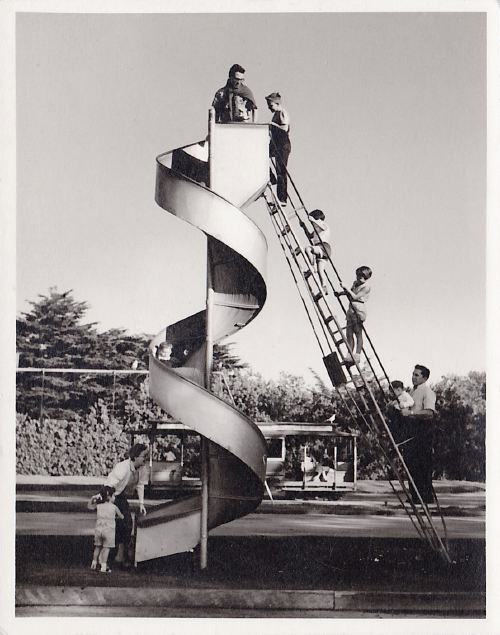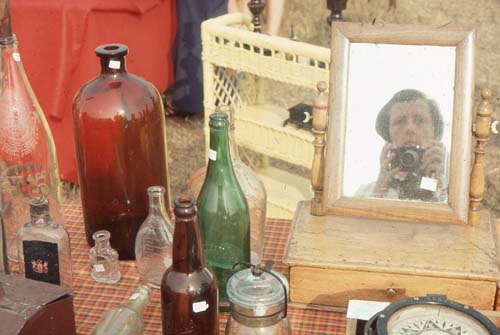| « Dancing & Diversity: Chicago Dancing Festival | Constantly Consuming Culture to Showcase Work of Little-Known Chicago Artists » |
Photography Tue Aug 13 2013
The Curious Case of Vivian Maier's Copyright
By Julia Gray

A photo by Vivian Maier, courtesy of Ron SlatteryVivian Maier found fame after her death through the efforts of the collectors who own most of her prodigious work. But depending on how U.S. copyright law is interpreted, the ultimate benefactor of Maier's fame may turn out to be the state of Illinois.
Born in 1926 in New York City to a French mother and an Austro-Hungarian father, Vivian Maier was a nanny by trade. She worked for several families in the Chicago area, and was known to be an extremely private person who her charges say seemed to bask in the shroud of mystery surrounding her. Although she was rarely without a camera, snapping photos while on duty and on her off days, her employers knew little about her talent as a photographer.
The sale at auction of her unpaid storage lockers in the fall of 2007 was the key to her discovery as an artist, but it wasn't until just before Maier's death in April 2009 at age 83 that her identity was learned. Her photos were soon electrifying the art world with their gritty depictions of life on the streets of Chicago and other cities.
Today, the majority of Maier's work -- prints, Super-8 films and thousands of negatives -- is owned by three men: Jeffrey Goldstein, John Maloof and Ron Slattery. Both Goldstein and Maloof have sold prints in limited editions through galleries.
Slattery only has the original prints and some negatives that he bought at the 2007 auction. Goldstein and Maloof have obtained a great deal more of Maier's artistic output, as well as cameras and other personal items, from her estate. They both sell limited edition prints through galleries. Goldstein has also published a book of Maier's photos, and Maloof is working on a documentary about her discovery and legacy, which will debut at the Toronto International Film Festival in September.
This is where the legacy of Maier takes an interesting turn. The legality of these new print editions of Maier's photos may be in question.
"In Illinois, if a person dies without a will, their property goes to their closest living relatives. But if they literally have no living kin anywhere in the world, then the decedent's property will 'escheat' to the State of Illinois. That rarely happens, though, because the law is written so that the property will go to the decedent's relatives, even if they are very distant," said Steven Dawson, a trusts and estates lawyer with Bryan Cave LLP.
Maier died without a will and no known heirs, which, according to Illinois law, makes her possessions the property of the state. However, the probate court papers for her estate make no mention of her photography equipment or artwork, so the state of Illinois may not have been aware of that material. The prints and negatives sold at auction before her death are free from any claim from the state, but anything sold after her death may be less safe.
If the state of Illinois does decide to claim Maier's copyright, several scenarios could happen. First, the state could do nothing, which would allow the owners of her work to continue with their ventures. Second, if the state decides it is the rightful owner of Maier's work, cease and desist letters will be sent to the current owners explaining the laws of succession, how the state is now the main beneficiary, and that any selling of her work needs to stop and all profits made would need to be paid to the state.
Another option is the state could decide that instead of a cease and desist order, the current owners may continue selling her work but royalties would be collected by the state. In this instance, the state could pit the owners against each other, depending on who will pay the state more royalty money. Finally, if the current owners don't cooperate, the state could sue them in federal court for ownership. However, before a lawsuit could proceed, the state would have to obtain the copyright.
Furthermore, the probate papers do not mention Maier's intellectual property -- her copyright on both printed and unprinted photos. Nor is there any copyright of her work registered with the United States Copyright Office. Depending on how the law is interpreted, the copyright on Vivian Maier's photography, her life's work, may now belong to the state of Illinois. Or maybe not.
"It's not as simple as making one or two calls because if it was, John and I would've been done with this, real quick and real cheap and inexpensively. It's a complex thing. No one person seems to have the same answers," Goldstein said.
The last sentence has some truth to it: None of the probate, estate or intellectual property attorneys contacted for this story had the same answers with regards to who gets what when a person without a will or heirs dies.
However, the one aspect that remained consistent throughout has been the issue of copyright. According to Dawson, the federal copyright law clearly states that the mere ownership of an object like a painting — the physical embodiment of a work — does not convey any right to the copyright in that work. In other words, just because you own a picture doesn't mean you're allowed to make copies and sell them, unless you have express consent of the artist or copyright holder. The same applies to negatives; owning a negative doesn't entitle you to print from the negative unless you also own the copyright.

A self portrait by Vivian Maier; photo courtesy of Ron Slattery
Goldstein also mentioned the orphan works law as a way around copyright. Put simply, an orphan work is a copyrighted work for which the owner of the copyright cannot be found. However, according to experts, since Maier's copyright was not registered with the U. S. Copyright Office it's a stretch to apply this particular statute to the current situation.
The same could be said for Illinois Self-Service Storage Facility Act, with particular attention to Section I, which states:
A purchaser in good faith of the personal property sold to satisfy a lien, as provided for in Section 3 of this Act, takes the property free of any rights of persons against whom the lien was valid, despite noncompliance by the owner with the requirements of this Section.
Here, the word "rights" is a broad term, and copyright is not mentioned. Also, according to experts, since this is a state law and the copyright law is a federal one, the state law cannot pre-empt federal law.
Industry observers estimate that the value of Maier's work — prints, negatives, film and book rights, Super-8 movies, exhibits — range from the mid-six figures to the tens of millions of dollars. As far as the state of Illinois is concerned, the revenue made from Maier's work could help alleviate some of the state's budget woes over time.
John Maloof said he believes that Maier's worth is "nowhere near the high end of what's been quoted." Maloof said a non-disclosure agreement with Goldstein prevents him from discussing the copyright and other business issues in detail, but he did say that research was done with regards to the copyright "to get what we're doing in the clear."
Slattery, at this point, is only selling Maier's vintage photographs and not prints from the negatives because he's "not comfortable with the current situation" with regards to the copyright. Estate liquidator Roger Gunderson, who originally purchased the first five of Maier's seven storage lockers, said he would consider going after Maier's copyright if the odds of him obtaining it were "better than 50 percent." Since Gunderson was the first to own Maier's work, he could consider citing the aforementioned Section I of the Illinois Self-Storage Facility Act as part of his case. His rights to Maier's copyright could possibly trump those of Goldstein's, Maloof's or Slattery's.
According to Cook County State's Attorney spokesman Stephen Campbell, the Vivian Maier case is "a private, civil case it is not something the state's attorney would be interested in unless an heir came forward. They only deal with cases where charges are brought." In order for that to happen, an heir would contact the police which could prompt an investigation, and if any type of malfeasance was found, charges would then be filed with Cook County State's Attorney financial crimes department.
If the state did step in and decide to investigate, Goldstein believes it would be "a very sad day if the state gets a hold of it."
~*~
Julia Gray is a freelance journalist who has written for the Beachwood Reporter, Time Out Chicago and TheStreet.com. She is also the occasional co-host of the Internet radio show "The Matthew Aaron Show" where she has interviewed folks like humorist Kelly Carlin, actors Timothy Busfield, Craig Bierko, and producer Mark Canton. Feel free to check out her blog.
Previous coverage of Vivian Maier on Gapers Block: Getting the Right Angle on Vivian Maier









randolf hurts / August 13, 2013 11:34 AM
Why would it be a very sad day if the state gets a hold of it?
I think a far better tribute to the late Vivian Maier would be a free museum for all to enjoy her works. Instead of three dudes selling everything off piecemeal, making money of someone else's work.